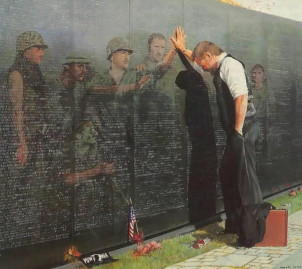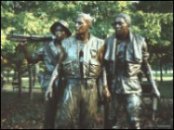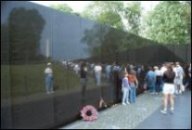 Home FACs More About FACs The AO A Shau Valley • A Shau SF Camp Hué • Hué Cit Airfield • MACV Compound • LCU Ramp • Hué Goose Battle of Hué (Tet 1968) • Trail FACs The Missions Visual Recon • Sunken Sampan Close Air Support • CAS Munitions • Rules of Engagement • TACS • Battle at Hua Cu Interdiction • McNamara Line • Choke Points Ranch Hand Trail Dust Mission Arc Light SAR Hammer 51 Rescue Search for Jolly 23 • Msn Reports • Search Area Map • Search Rejoined • Jolly Green 23 Found! • Link to Past Jungle Penetrator Legacies Aircraft O-2A Glossary Resources Contact Return to Top Return to Top Return to Top |
 
Here are a few of the legacies of that conflict still impacting our lives.
Once controversial in concept and location, the Vietnam Memorial has become a catalyst in the healing of emotional wounds and a poignant reminder of the true cost of war. The Virtual Wall • Database of Names Vietnam War POW/MIA Issue • Status of Americans Unaccounted For in SEA An example of an MIA recovery effort • Photos Recovery of Jolly Green 23 Crew Remans Because of the unique stresses of the war in Vietnam and the focus of home front frustration on the returning veterans, may of those who served in Southeast Asia have had difficulty adjusting. Many groups have formed to support and address the issues of the Vietnam-era veteran. Here are links to just a few. In the Atlanta area: The Atlanta Vietnam Veterans Business Association Many feared that the use of chemical defoliants in Southeast Asia would open the United States to changes of chemical warfare. That turned out to be the least of our worries. Since the end of the war, Agent Orange has been proven to contain a component (dioxin) which is a known carcinogen. Some claim that this fact was known when the decision to use Agent Orange was made. Agent Orange and its adverse medical impact has become a veteran issue as well as an international health concern. Frequently Asked Questions About Agent Orange Agent Orange & Mitigation Efforts Much of the controversy over the Vietnam War centered on the Selective Service System -- the draft. The transition to an all volunteer force in the 1970's was an attempt to remove selective service as a social issue. As America again faces the prospect of an extended international conflict, the reinstatement of the draft has become a visible issue. Retired Officer Magazine, July 2000 (Used with permission of The Retied Officer Association, now MOAA) The following passage is from Parameters, Spring 1994:
This document is sometimes referred to as the Powell-Weinberger Doctrine. General Powell was Secretary of Defense Weinberger's miitary assistant and drafted this doctrine. * Full Text of Weinberger Speech: "Uses of Military Power" - 28 Nov 1984 (pdf) The decision of President Johnson to commit America to a major war without the consent of Congress was another major controversy resulting from the Vietnam War. Congress corrected the situation with the War Powers Act * in 1973, but this law itself has been the focus of debate in recent years over U.S. operations around the world. Resolution Language Discussion: Heritage Foundation (1995) Discussion: American Legion Magazine (1999) (Used with permission of The American Legion Magazine) Discussion: "Who Takes us to War?" Charles Krauthammer Washington Post, June 23, 2011 |


